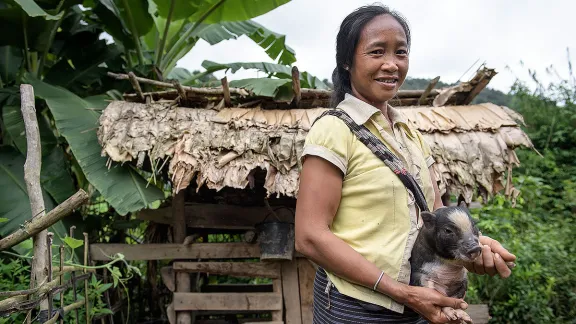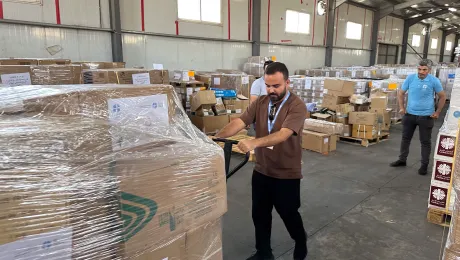
A Laotian woman with a piglet provided by the LWF. Photo: LWF
LWF horticulture classes and small loans improve lives
(LWI) - Beans, cabbage, and aubergines. Joy tends all her plants with care. The 19-year-old looks after every bean plant, however small. Because, if it does not thrive, there will be nothing to eat. This is everyday life in Laos. It is hard to imagine how valuable her little field is to her and her family.
In Donemai, a village in the highlands of Laos, no-one has a permanent job or reliable income. Everyone more or less looks after themselves. Most people live from hand to mouth, foraging in the dense forests for wild vegetables, forest herbs, and manioc. Or they hire themselves out as day laborers. Those who do have fields require the whole family to work on it, for them to produce enough crops.
“If there is no work and I can’t find anything edible in the forest, we go hungry to bed,” a neighbor of Joy’s says. His reserves for lean times consist of two cobs of corn and one banana.
Before the Lutheran World Federation came we didn’t plant any vegetables. We didn’t know how
Growing vegetables is still an unusual activity in the remote villages in Laos. “Before the Lutheran World Federation came we didn’t plant any vegetables. We didn’t know how” Joy’s mother Sao says. She was one of the first in her village to attend a training course run by the LWF and received a basic grant of seeds and tools.
Since then Sao has worked in her garden every day - watering, weeding and picking the ripe vegetables. The crop feeds the family. Now, instead of uncertainty about what to eat for dinner, she puts healthy vegetables on the menu. Sometimes she also sells vegetables to send her two younger children to school or to save money. “When I have saved enough I would like to raise animals, perhaps pigs or goats.”
Real life piggy banks
Raising livestock is a simple way of earning a living. There is only one big problem: the poorest people in the village cannot afford to buy a pair of pigs or goats – and without parents, there is no offspring. The Lutheran World Federation is familiar with this dilemma and supports people who are especially vulnerable – widows, people with disabilities or elderly folk with no family – with microloans.
One of them is 37-year-old Bun Kam. A widow, she has always struggled to keep her six-person family going. Meanwhile, she has built up a new livelihood. First, she attended a course offered by the Lutheran World Federation and got to know everything she needed to know about handling animals. Then she had to build a shed with pigpens. When all the preconditions were fulfilled for successful animal husbandry, the Lutheran World Federation gave her a loan of 2 million Lao Kip - about EUR 200.
“I bought a male and three female pigs,” she says. After only one year she had six piglets. “I sold two of them for 800,000 Kip each. Then I bought clothing for the family, school materials and milk,” she reports proudly. She has already paid back most of the loan. Also, she has another eight ‘piggy banks’ that she intends to sell later.
Bun Kam has successfully created a new livelihood, just through this one-time assistance. Start-up assistance for growing vegetables and microloans are two examples of how the Lutheran World Federation is enabling people in Laos to make a living.
It is easy to see how well the people in the villages in the Vieng Phouka region are doing – by looking at the number of animals they have. Pigs, goats and the occasional cow are essential sources of livelihood for small farmers. There is plenty of vegetable feed for the livestock and a natural reward for labor: offspring. The young animals can then be raised and sold at a profit.
The LWF works closely with the Laotian government.
“LWF facilitates the district agriculture department in conducting vegetable gardening and livestock raising training and the provision of extension services,” LWF representative for Myanmar and Laos, David Mueller, says. “This introduces a sustainable relationship between villagers and technical service providers. Matched with startup microloans, it results in sustainable livelihoods.”


